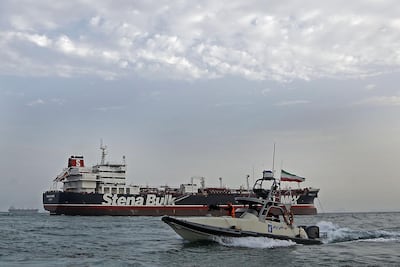The foreign ministers of some of Europe’s most powerful countries are to hold talks on Friday on strategies to ensure freedom of navigation in the Strait of Hormuz and preserve the 2015 Iranian nuclear deal.
France, Germany, the UK and the EU’s top diplomats will meet in Helsinki amid efforts to encourage greater diplomacy between Iran and the US.
Although their meeting has not been officially announced, the four parties are likely to look at ways to support Iran’s ailing economy to ensure it abides by the agreement to limit its nuclear strength.
Iranian Foreign Minister Javad Zarif unexpectedly turned up for G7 talks in Biarritz, France this week after an invitation from President Emmanuel Macron.
It led to calls for a summit between US President Donald Trump, who has taken a hard-line approach to Iran, and Iranian leader Hassan Rouhani.
“Our discussions will build on the momentum of the positive G7 talks on Iran as we seek to de-escalate tension,” UK Foreign Secretary Dominic Raab said.
“The nuclear deal is the only deal on the table that prevents Iran from getting a nuclear weapon and we will continue working together to encourage Iran to uphold the agreement in full."

The US last year pulled out of the deal and reimposed sanctions on the Iranian economy, which has been hit hard.
In response, Iran has in recent months broken enrichment targets set out in the deal.
Tension in the Gulf is high after incidents in which oil tankers were sabotaged and Iranian forces seized a British-flagged vessel in early July.
“We also need the broadest international support possible to tackle the threats to international shipping in the Strait of Hormuz,” Mr Raab said.
Iran’s deputy foreign minister, Abbas Araghchi, said this week that Mr Rouhani had told Mr Macron there were two options to preserve the nuclear deal.
“One is for them to go to the Americans and get waivers again for oil buyers so they can buy oil from Iran," Mr Araghchi told state TV.
"Or if they cannot do that, they should buy that level of oil using a credit line."
He said Iran would comply with the 2015 nuclear deal if it could sell oil and have full access to its revenues.
Mr Trump has said he would meet Mr Rouhani and hinted he could be open to a credit line.
Analyst Esfandyar Batmanghelidj said that a $15 billion (Dh55.1bn) credit line would be the same as an oil waiver.
“What Iran wants is to sell oil and use funds freely," Mr Batmanghelidj tweeted. "The French proposal targets 700,000 barrels per day. At $60 per barrel, that is $15bn a year in revenue.
“Basically, 700,000 bpd is $15bn. I don’t think Iran needs both to get to the negotiating table. The credit line is a fallback if the US can’t be convinced to roll back its total export ban.”
But Iranian officials have been much more cautious of a summit amid protests from hardliners and the belief that the Trump administration may not offer anything substantial.


